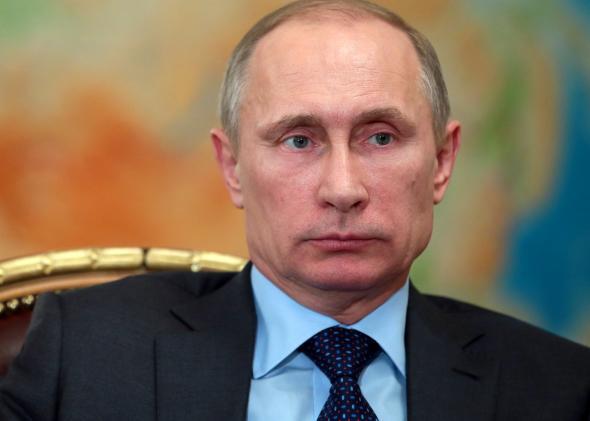With events in Ukraine changing so quickly, it is impossible to predict what will happen next. But now that the Russian parliament has rubber-stamped Russian President Vladimir Putin’s request to invade the country, a few observations are already in order.
What seems to have happened in the Crimea this week is a grotesque imitation of the Maidan protests that ousted former Ukrainian President Viktor Yanukovych from office. Under the cover of some street protesters, masked self-defense forces with the help of Ukrainian Berkut—evidently including units responsible for the crackdown in Kiev—captured government buildings to force a political decision to recognize Yanukovych as the president of Ukraine.* Armed gunmen without identifying insignia captured two airports (as well as a center for investigative journalism), disrupted communications with the mainland, and are blocking some Ukrainian military bases on the peninsula. Early Saturday morning, the Crimean government then requested Russia’s help, as did Yanukovych, who is now obviously Putin’s puppet. That then let Putin plausibly deny his actions as an invasion, casting it instead as an internal Ukrainian affair. No shots have been fired, yet.
If the plan is to install Yanukovych in a Russian-controlled Crimean mini-state, it might work, for a while. But that does not mean it will be easy. Putin’s imperialist gambit may turn out to be his Waterloo.
To see why, just open a map. That narrow strip of land tethering northern Crimea to the Ukrainian mainland, called the Perokop Isthmus, is the peninsula’s lifeline. What’s left out of most Western analyses of Putin’s brazen military intervention is the Crimea’s complete economic dependence on the mainland, which provides nearly all of its electricity and water and about 70 percent of its food.
That’s why the Crimea is even a part of Ukraine. Don’t believe that myth about the peninsula being a “gift” from Soviet leader Nikita Khrushchev to what was then the Ukrainian Soviet Socialist Republic in 1954. For laughs, people often add that he did it when he was drunk. That story was actually concocted during the early 1990s, when Russia first started making mischief with pro-Russian separatism.
Then, the movement had genuine public support because the collapse of the Soviet Union left a disgruntled Russian majority on the peninsula, including many military retirees for whom Crimea was like a Soviet Florida. But the only reason that Crimea had a Russian majority was because Josef Stalin deported the native Crimean Tatars en masse to Central Asia after World War II and resettled Russians to replace them.
Crimea suffered terribly during the war. Its transfer from the Russian Soviet republic to the Ukrainian one made little substantive difference in the totalitarian Communist state. But it was a completely sober decision for Ukraine to take over the peninsula’s rebuilding since Moscow was too far away and was mucking the whole thing up. The Russians that Stalin sent (usually not willingly) came mostly from forested regions. They knew nothing about agriculture in the dry Crimean steppes that are a natural extension of southern Ukraine.
Most of the Crimea is basically a desert, with less annual rainfall than Los Angeles. It is impossible to sustain its 2 million people—including agriculture and the substantial tourist industry—without Ukrainian water. Current supplies aren’t even enough. In Sevastopol, home of the Black Sea Fleet, households get water only on certain days. In fact, on Feb. 19, when snipers were shooting protesters on the streets of Kiev, Sevastopol applied for $34 million in Western aid (note the irony) to improve its water and sewer systems.
The Crimea’s dependence on Ukraine for nearly all of it electricity makes it equally vulnerable to nonviolent retaliation. One suggestion making the rounds of the Ukrainian Internet is that the mainland, with warning, shut off the power for 15 minutes. It may not normalize the situation, but it could give Moscow pause. Of course, Russia could retaliate by cutting off Ukrainian gas supplies, but that would mean cutting off much of Europe as well. Besides, Ukrainians proved this winter that they aren’t afraid of the cold, and spring is coming.
So, while Vladimir Putin rattles his sabers, the authorities in Kiev might decide to just hold tight, for now. If Yanukovych destroyed his own power, he may very well destroy Putin’s as well. The fugitive ex-president, whose greed extended deep into the peninsula, isn’t a popular figure there either and any efforts to install him—especially if they bring real hardship to the locals—may spark a Maidan II.
That’s because the Crimea has changed since the 1990s. After independence, Ukraine welcomed back the Crimean Tatars. Some 300,000 have returned from exile and their numbers are growing, with continued migration and birth rates higher than either Russians or Ukrainians. They strongly oppose any separatism, and they will not go peacefully into a Russian-controlled, authoritarian “Yanukistan” along the lines of Transdnistria. Not only are they extremely well organized, they are Muslims with friends. Representatives from Russia’s Tatarstan region are already supporting them. Turkey, which controlled the Crimea for much longer than Russia ever did and has close ties with the Crimean Tatars, is watching. So are Chechen rebels.
The Crimea could explode into bloodshed. To prevent if from happening, maybe turning off the power for 15 minutes will force a reboot in Putin’s aggressive, misguided, and ultimately doomed scheme.
Correction, March 3, 2014: This article originally misspelled the name of the Berkut, Ukraine’s special police. (Return.)
